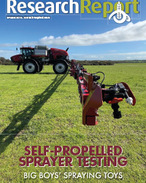This article is 8 years old. Images might not display.
When mouse baits are manufactured illegally, people put themselves, livestock, pets and wildlife at risk. In contrast, by using a registered chemical and following the label people can be assured they are minimising any risks.
Agriculture Victoria Leading Chemical Standards Officer Alex Perera said that there are reports of mice numbers increasing in the state's north-west, and heavy demand for all types of mouse bait.
"The temptation to make your own bait can be great, but this is risky and dangerous for you, and the environment, and can lead to the accidental poisoning of pets, working dogs and native animals," Ms Perera said.
"Products that are registered for mouse control have been through a rigorous assessment by scientists at the Australian Pesticides and Veterinary Medicines Authority (APVMA) and are formulated to limit the impact on non-target animals," she said.
"The product labels will often contain specific directions on how to prevent off-target poisonings.
"There are also significant penalties associated with the illegal use of agricultural chemicals.
Department of Environment, Land, Water and Planning (DELWP) Wildlife Officer Glenn Smith said some reports of native bird deaths from suspected homemade mouse bait were already being received.























